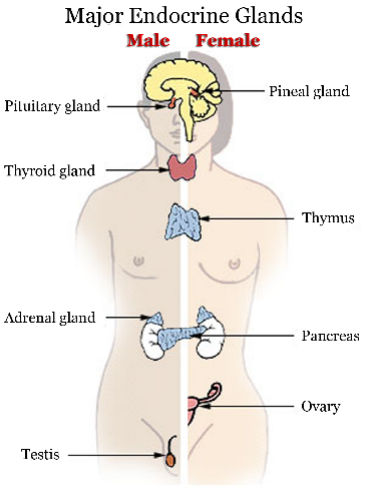Endocrine System
The job of the endocrine system is to release hormones into the bloodstream. Hormones are messengers from the brain that cause changes in certain cells. The body maintains homeostasis by using hormones to regulate the behavior of all the organ systems. Hormones are typically regulated by feedback loops, which adjust the amount of hormones released based on conditions in the body.
Key Terms
Endocrine System: The organ system of glands that release hormones into the blood.
Hormone: A chemical messenger molecule.
Hypothalamus: A part of the brain that secretes hormones. These hormones tell the pituitary gland to secrete or stop secreting hormones. Provides a link between the nervous and endocrine systems.
Target Cell: The type of cell on which a hormone has an effect.
Major glands in the endocrine system:
Adrenal Glands: Located above the kidneys. Each gland has an inner and outer part. The outer part, called the cortex, secretes hormones such as cortisol. The inner part of each adrenal gland, called the medulla, secretes fight-or-flight hormones such as adrenaline.
Gonads: Secrete sex hormones. The male gonads are called testes. They secrete the male sex hormone testosterone. The female gonads are called ovaries. They secrete the female sex hormone estrogen.
Pancreas: Located near the stomach. Its hormones include insulin and glucagon. These two hormones work together to control the level of glucose in the blood.
Pineal Glands: A tiny gland located at the base of the brain. It secretes the hormone melatonin. This hormone controls sleep-wake cycles and several other processes.
Pituitary Glands: Attached to the hypothalamus by a thin stalk. The posterior (back) lobe stores hormones from the hypothalamus. The anterior (front) lobe secretes pituitary hormones.

Thyroid Gland: A large gland in the neck. Thyroid hormones increase the rate of metabolism in cells throughout the body. They control how quickly cells use energy and make proteins.
Parathyroid Glands: Located behind the thyroid gland. Parathyroid hormone helps keep the level of calcium in the blood within a narrow range.
How Hormones Work
The endocrine system is a message-relaying system that uses hormones. compared to the fast transmission of electrical nerve impulses by the nervous system, hormones travel more slowly. A hormone travels through the bloodstream until it finds a target cell with a matching receptor it can bind to. When the hormone binds to a receptor, it causes a change within the cell.
Steroid hormones:
- Made of lipids such as phospholipids and cholesterol. They are fat soluble, so they can diffuse across the plasma membrane of target cells and bind with receptors in the cytoplasm of the cell.
- The steroid hormone and receptor form a complex that moves into the nucleus and influences genes expression.
- Examples: cortisol, estrogen, testosterone.